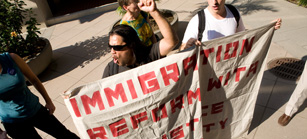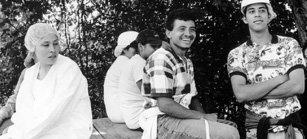
The nation's foreign-born population will soon surpass the 14.7 percent share reached in 1910, when the Statue of Liberty beckoned to Europe's "huddled masses yearning to breathe free." Most of the new immigrants are from Latin America. They live under tremendous economic uncertainty, especially those who came illegally. But evidence shows that over time, immigrants contribute far more than they cost.
Surviving in the United States:
Leticia has tasted the American Dream and found it bitter. She came to Minneapolis from Mexico in 2000, planning to return a year later with a lot of savings. But just staying afloat in the United States turned out to be far more expensive than she'd expected.
Becoming a Citizen:
Most people think marrying a U.S. citizen is a sure-fire route to U.S. citizenship. Not quite.

It's sinking in among Americans that the nation's largest wave of immigration did not happen a century ago. It's happening now. About 35 million of us were born in other countries. That's one in eight residents of the United States. Immigrants come from all over the globe, but Latino immigration is remaking the country. And not just on the coasts and in the Southwest.
Coming to the United States:
The Pathways to Permanent Legal Residency
In 2007, just over a million immigrants got their green cards. How easy is it to become a legal resident?
Case Study of a Community:
Today East Lake Street in Minneapolis is a vibrant corridor of ethnically diverse businesses, but the area was once considered a neglected urban wasteland.

Hay una versión en Espanol disponible.
You can download the radio program or read the transcript.
Learn more about immigration in the United States, and about the producers of this program.
Nuevo South was produced by John Biewen and Tennessee Watson of the Center for Documentary Studies at Duke University.
This program is part of The Real Face of Poverty, American RadioWorks' series on poverty and opportunity in the United States. Support for this series comes from Northwest Area Foundation. Major funding for American RadioWorks comes from the Corporation for Public Broadcasting.
